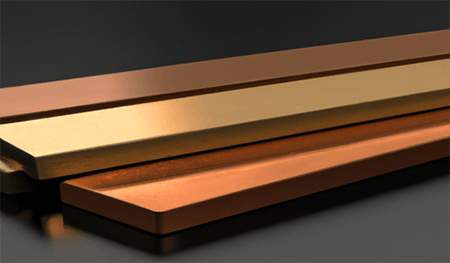The Difference Between Brass, Bronze and Copper – What Sets Them Apart

When choosing the right material for your project, understanding the differences between brass, bronze, and copper is crucial. These materials are often used in various industries, but each has unique properties that set them apart. At CAPtec, we offer expert guidance to help you choose the best material for your needs.
Physical Properties Comparison
Brass, bronze, and copper each have distinct physical properties that influence their performance in different applications:
Copper is a soft, malleable metal with excellent conductivity and corrosion resistance. It is often used in electrical and plumbing applications.
Brass, an alloy of copper and zinc, is stronger and more durable than copper, offering better corrosion resistance and ease of machining.
Bronze, typically made from copper and tin, is highly resistant to corrosion, especially in marine environments, and is tougher than both copper and brass.
Price Difference
Copper is generally the least expensive of the three, but prices can fluctuate based on market conditions. Brass and bronze tend to be more expensive due to their alloy composition and the added value of zinc and tin. However, the cost difference is often justified by the material’s specific advantages in durability and corrosion resistance.
Advantages of Each Material
Copper: Ideal for applications that require high conductivity, such as electrical wiring and heat exchangers.
Brass: Offers a good balance of strength, corrosion resistance, and machinability, making it a popular choice in plumbing fittings and decorative hardware.
Bronze: Known for its toughness and wear resistance, making it perfect for applications in marine, aerospace, and heavy-duty industrial environments.
Applications
Copper is widely used in electrical components, plumbing, and roofing.
Brass is commonly found in musical instruments, electrical connectors, and decorative items.
Bronze is used in applications where strength and corrosion resistance are critical, such as bearings, marine hardware, and statues.
Technical Process
The technical process of working with these materials varies. Copper is often processed through extrusion or casting. Brass and bronze are typically cast into molds or formed into sheets, then machined or welded into shape. The choice of process will depend on the specific application and material requirements.
Choosing the Right Material for Your Project
Selecting the right material for your project depends on several factors, including strength, corrosion resistance, and cost. At CAPtec, we understand the importance of choosing the right material, and we are here to assist you with tailored solutions for your specific needs.
For expert advice and high-quality materials for your project, contact CAPtec today. We can help guide you in selecting the perfect material to ensure the success of your project.
The Difference Between Brass, Bronze and Copper – What Sets Them Apart